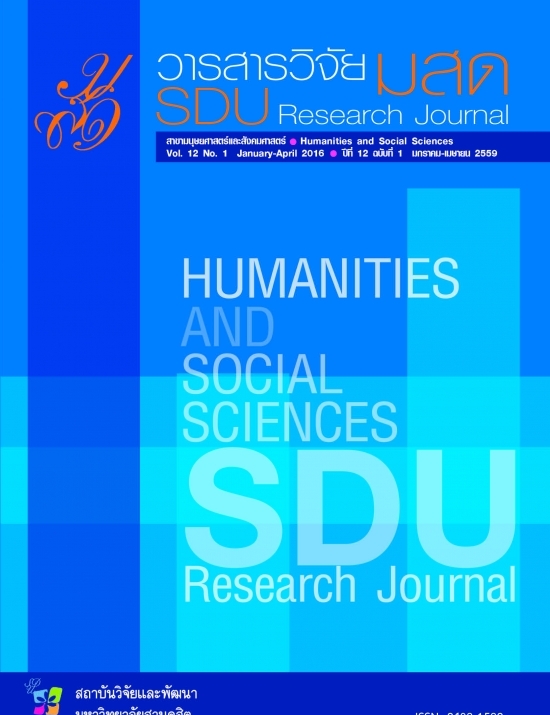ความชำนาญในการสนทนาภาษาอังกฤษของนักเรียนระดับมัธยมและปริญญาตรี ในมุมมองของอาจารย์เจ้าของภาษา
Keywords:
English proficiency, sources of information, status quoAbstract
English is the language that Thai students begin to learn from the beginning of their elementary school years, and continuing through primary, secondary schools up to university levels. However, it appears that after all these years they do not seem to be able to communicate effectively. Certainly, there are many problems which contribute to students’ incompetency. It is possible that the problems are from the student themselves, and their lack of desire, motivation and passion to learn, uninspired learning atmosphere, and even more important, the ability of English teachers themselves To further support the article, various useful sources of information had been analyzed and compiled in order to obtain the facts which could be able to constitute to the finding of solutions on how to improve, and possibly solve English inefficiency. Furthermore, several key methods used in the finding included information from reliable websites, related journals and newspaper articles; interviewing Thai and Foreign teachers and high school students, particularly in Lampang municipalities. Additionally, related data and numbers were also factored in to this study to give readers clearer pictures of the situation As ASEAN/AEC is approaching, it is essential that Thai students have to improve their English skills in order to be successful and be able to compete in today’s competitive environment, domestically and internationally. It also serves as guidelines for evolved stakeholders, responsible agencies and institutions such as government regulators, public and private school administrators/teachers, and of course, students to follow and take notices that the English proficiency levels would not have been improved if we continue to do the same as we had done in the past without daring to change or to simply put it: sticking to status quo.
References
20language%20classroom%20anxiety. pdf. Krashen, S.D. & Terrell, T.D. (2000). English as a second language is acquired by Picking up the language from conversations with others or immersion rather than learned only through teachers’ instruction in a classroom. Illinois Reading Council Journal, 39(4), 11. Mandigo, M. English teacher, Boonyawat Withayalai school, Lampang province. Interview, November 25, 2013. Mann, R. English lecturer, Lampang Rajabhat University. Interview, November 18, 2013. Mongthalay, R. Supervisor of the Secondary Educational Service Area Office 35. Interview, December 15, 2013. Panyathanakoon. W. (2012). Trend of the Use of English in Key ASEAN Countries. Retrieved April 20, 2013, from www.deepsouthwatch.org/node/2780. (in Thai) Phillips, N. Former lecturer, Mahidol University. Interview, October 20, 2013. Tangkitvanich, S. (2013). Thai educational system sets up future failure. Retrieved May 9, 2013 from www.bangkokpost.com. Thanworakul, N. English lecturer, Lampang Rajabhat University. Interview, January 10, 2014. Tongaht, C. (2012). The Challenges Pertaining to the Key Context in Educational Management: Educational Journals, Naresuan University, 14(3), 108 – 116. Tsiplakides, I. (2009). Helping Students Overcome Foreign Language Speaking Anxiety in the English Classroom. International Education Studies, 2(4), 39. Weerawong, O. (2011). Thai students learn English to pass exams. Retrieved May 7, 2013, from www.manager.co.th/campus/viewnews.aspx.







